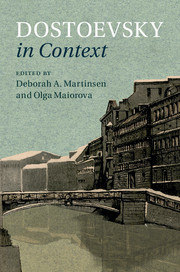Book contents
- Frontmatter
- Contents
- List of illustrations
- Notes on contributors
- Acknowledgments
- Note on citation, transliteration, glossary, and dates
- Chronology
- 1 Introduction: the many worlds of Dostoevsky
- PART I SOCIAL, HISTORICAL, AND CULTURAL CONTEXTS
- PART II LITERATURE, JOURNALISM, AND LANGUAGES
- Glossary
- Further reading
- Index
- References
1 - Introduction: the many worlds of Dostoevsky
Published online by Cambridge University Press: 18 December 2015
- Frontmatter
- Contents
- List of illustrations
- Notes on contributors
- Acknowledgments
- Note on citation, transliteration, glossary, and dates
- Chronology
- 1 Introduction: the many worlds of Dostoevsky
- PART I SOCIAL, HISTORICAL, AND CULTURAL CONTEXTS
- PART II LITERATURE, JOURNALISM, AND LANGUAGES
- Glossary
- Further reading
- Index
- References
Summary
Fyodor Dostoevsky lived in many worlds – artistic, journalistic, political, religious, and economic, to name a few – worlds which differed from each other so profoundly that they frequently occupied opposite ends of the social and ideological spectrum. Dostoevsky spent most of his life among the intellectuals of St. Petersburg, debating in journals and in person over philosophical, political, aesthetic, and social issues. But for four years as a political convict he lived in leg-irons at hard labor in a Siberian stockade, alongside lower-class, illiterate criminals. Upon release, he was forced into the life of a soldier: made, as a private, to endure military drills and to sleep in the confined space of an army barracks in a remote town on the Kazakh steppe, with few books and little control over his life. After returning to Petersburg, however, Dostoevsky was able to travel extensively across Europe, explore its cultural treasures, and pursue the activities of his choice. He experienced the joy of literary creation, yet endured incapacitating epileptic seizures. For eight years, Dostoevsky suffered from compulsive gambling, hoping to change his fortune by pursuing a system at the roulette tables. Yet he spent another eight years as a disciplined editor, working around the clock to produce periodicals in a timely manner. In his youth, Dostoevsky joined a revolutionary circle and for the rest of his life remained sympathetic to radicals’ aspirations for a harmonious society, seeing revolutionaries as truth-seekers and self-sacrificers gone astray. After returning from Siberia, however, he wrote novels directed against the thinking that informed revolutionaries’ actions. He was a wholehearted believer in monarchy and the Russian people's devotion to the tsar and in later years gravitated toward the conservative establishment that exerted substantial influence at Court, although he always maintained his ideological independence. At various times Dostoevsky took on still other roles such as translator, literary critic, amateur actor, and public speaker. Perhaps the most unusual was his role as sole author, editor, and publisher of the monthly journal The Diary of a Writer, where he freely conversed with the public about a wide range of topics – from the most heated political controversies and pressing social problems to his literary projects and personal reminiscences – with the ultimate goal of becoming a voice that could reconcile conflicting political positions.
- Type
- Chapter
- Information
- Dostoevsky in Context , pp. 1 - 8Publisher: Cambridge University PressPrint publication year: 2016



